2018高考英语听力解题技巧
高考英语听力答题技巧
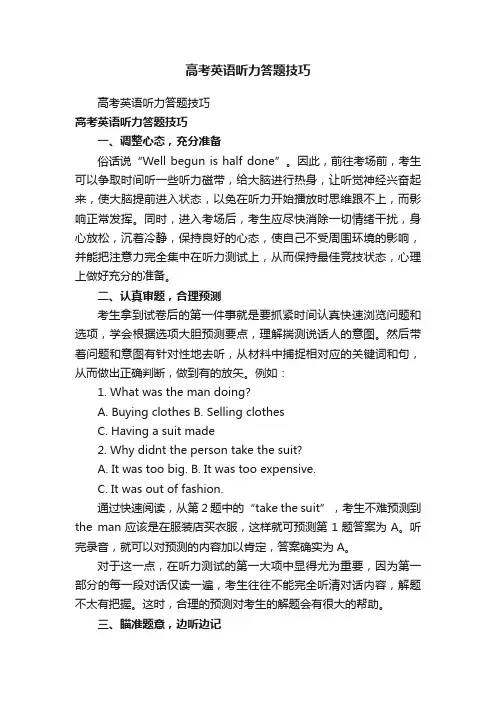
高考英语听力答题技巧高考英语听力答题技巧高考英语听力答题技巧一、调整心态,充分准备俗话说“Well begun is half done”。
因此,前往考场前,考生可以争取时间听一些听力磁带,给大脑进行热身,让听觉神经兴奋起来,使大脑提前进入状态,以免在听力开始播放时思维跟不上,而影响正常发挥。
同时,进入考场后,考生应尽快消除一切情绪干扰,身心放松,沉着冷静,保持良好的心态,使自己不受周围环境的影响,并能把注意力完全集中在听力测试上,从而保持最佳竞技状态,心理上做好充分的准备。
二、认真审题,合理预测考生拿到试卷后的第一件事就是要抓紧时间认真快速浏览问题和选项,学会根据选项大胆预测要点,理解揣测说话人的意图。
然后带着问题和意图有针对性地去听,从材料中捕捉相对应的关键词和句,从而做出正确判断,做到有的放矢。
例如:1. What was the man doing?A. Buying clothesB. Selling clothesC. Having a suit made2. Why didnt the person take the suit?A. It was too big.B. It was too expensive.C. It was out of fashion.通过快速阅读,从第2题中的“take the suit”,考生不难预测到the man应该是在服装店买衣服,这样就可预测第1题答案为A。
听完录音,就可以对预测的内容加以肯定,答案确实为A。
对于这一点,在听力测试的第一大项中显得尤为重要,因为第一部分的每一段对话仅读一遍,考生往往不能完全听清对话内容,解题不太有把握。
这时,合理的预测对考生的解题会有很大的帮助。
三、瞄准题意,边听边记听录音材料时,考生要把注意力集中在对整体内容的理解上,重在听懂每句话的意思和内涵。
只有领会了大意,明确了话题,才能对对话内容有整体了解,从而做好主旨大意题。
高考英语听力作答技巧
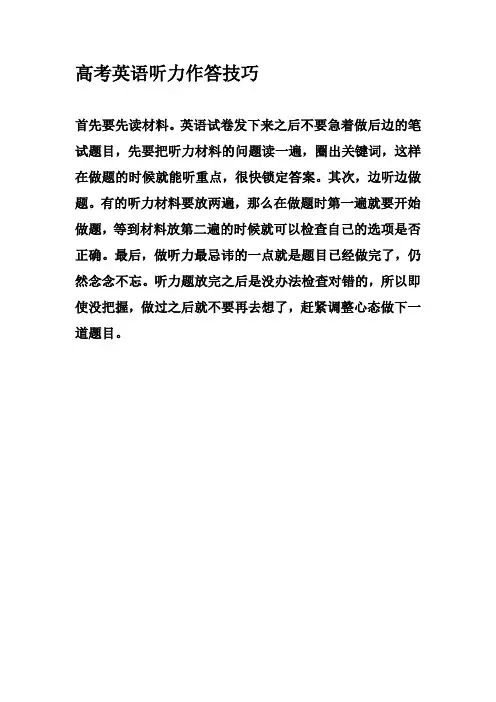
高考英语听力作答技巧
首先要先读材料。
英语试卷发下来之后不要急着做后边的笔试题目,先要把听力材料的问题读一遍,圈出关键词,这样在做题的时候就能听重点,很快锁定答案。
其次,边听边做题。
有的听力材料要放两遍,那么在做题时第一遍就要开始做题,等到材料放第二遍的时候就可以检查自己的选项是否正确。
最后,做听力最忌讳的一点就是题目已经做完了,仍然念念不忘。
听力题放完之后是没办法检查对错的,所以即使没把握,做过之后就不要再去想了,赶紧调整心态做下一道题目。
2018-2019-201X高考英语听力答题技巧-word范文 (4页)
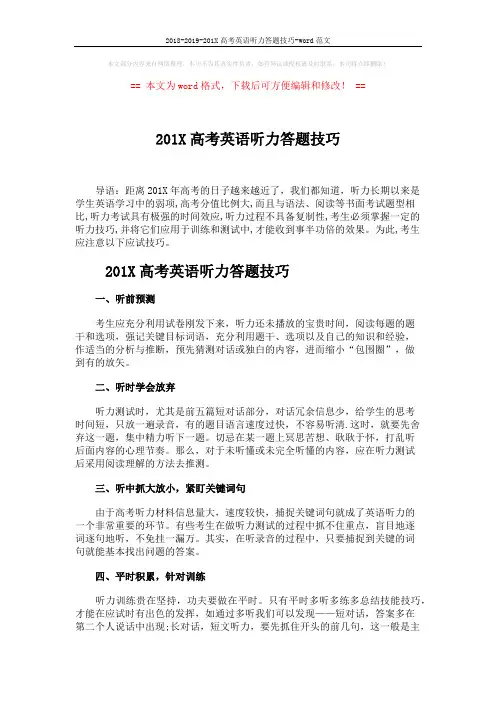
本文部分内容来自网络整理,本司不为其真实性负责,如有异议或侵权请及时联系,本司将立即删除!== 本文为word格式,下载后可方便编辑和修改! ==201X高考英语听力答题技巧导语:距离201X年高考的日子越来越近了,我们都知道,听力长期以来是学生英语学习中的弱项,高考分值比例大,而且与语法、阅读等书面考试题型相比,听力考试具有极强的时间效应,听力过程不具备复制性,考生必须掌握一定的听力技巧,并将它们应用于训练和测试中,才能收到事半功倍的效果。
为此,考生应注意以下应试技巧。
201X高考英语听力答题技巧一、听前预测考生应充分利用试卷刚发下来,听力还未播放的宝贵时间,阅读每题的题干和选项,强记关键目标词语,充分利用题干、选项以及自己的知识和经验,作适当的分析与推断,预先猜测对话或独白的内容,进而缩小“包围圈”,做到有的放矢。
二、听时学会放弃听力测试时,尤其是前五篇短对话部分,对话冗余信息少,给学生的思考时间短,只放一遍录音,有的题目语言速度过快,不容易听清.这时,就要先舍弃这一题,集中精力听下一题。
切忌在某一题上冥思苦想、耿耿于怀,打乱听后面内容的心理节奏。
那么,对于未听懂或未完全听懂的内容,应在听力测试后采用阅读理解的方法去推测。
三、听中抓大放小,紧盯关键词句由于高考听力材料信息量大,速度较快,捕捉关键词句就成了英语听力的一个非常重要的环节。
有些考生在做听力测试的过程中抓不住重点,盲目地逐词逐句地听,不免挂一漏万。
其实,在听录音的过程中,只要捕捉到关键的词句就能基本找出问题的答案。
四、平时积累,针对训练听力训练贵在坚持,功夫要做在平时。
只有平时多听多练多总结技能技巧,才能在应试时有出色的发挥,如通过多听我们可以发现——短对话,答案多在第二个人说话中出现;长对话,短文听力,要先抓住开头的前几句,这一般是主旨题的答案所在,而结尾处往往会再次呼应。
中部往往是细节题,这种实用的总结能够使我们在做题时事半功倍。
高考英语听力答题技巧
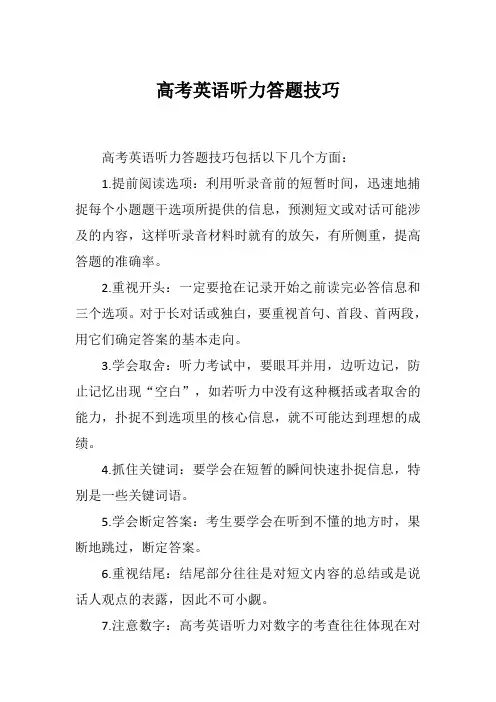
高考英语听力答题技巧
高考英语听力答题技巧包括以下几个方面:
1.提前阅读选项:利用听录音前的短暂时间,迅速地捕捉每个小题题干选项所提供的信息,预测短文或对话可能涉及的内容,这样听录音材料时就有的放矢,有所侧重,提高答题的准确率。
2.重视开头:一定要抢在记录开始之前读完必答信息和三个选项。
对于长对话或独白,要重视首句、首段、首两段,用它们确定答案的基本走向。
3.学会取舍:听力考试中,要眼耳并用,边听边记,防止记忆出现“空白”,如若听力中没有这种概括或者取舍的能力,扑捉不到选项里的核心信息,就不可能达到理想的成绩。
4.抓住关键词:要学会在短暂的瞬间快速扑捉信息,特别是一些关键词语。
5.学会断定答案:考生要学会在听到不懂的地方时,果断地跳过,断定答案。
6.重视结尾:结尾部分往往是对短文内容的总结或是说话人观点的表露,因此不可小觑。
7.注意数字:高考英语听力对数字的考查往往体现在对
各种号码(如电话号码、房间号码、汽车/轮船/飞机号码等)和时间及商品费用上。
判断正确数目时,听力材料中往往出现干扰项,这就要求考生认真听清原文,理清不同数目的来龙去脉,从而正确判断特定角度所需的正确数目。
8.判断事件发生的原因:考生应认真听清事件发生的全部过程及前因后果,去粗取精,去伪存真,排除可能出现的似是而非的原因,从而正确找出事件发生的真正原因。
9.果断选题:当机立断,决不能反反复复,甚至影响后面的答题。
切记不可因某个小题未听懂而患得患失,不可因一题失多题,造成一步跟不上,步步皆踏空的结果。
掌握以上技巧后,还需要排除一切干扰,全身心地投入语境、持之以恒地坚持高考全真模拟听力训练,这样在高考中定能取得理想的成绩。
最新-2018高考英语 听力理解提分秘笈 精品
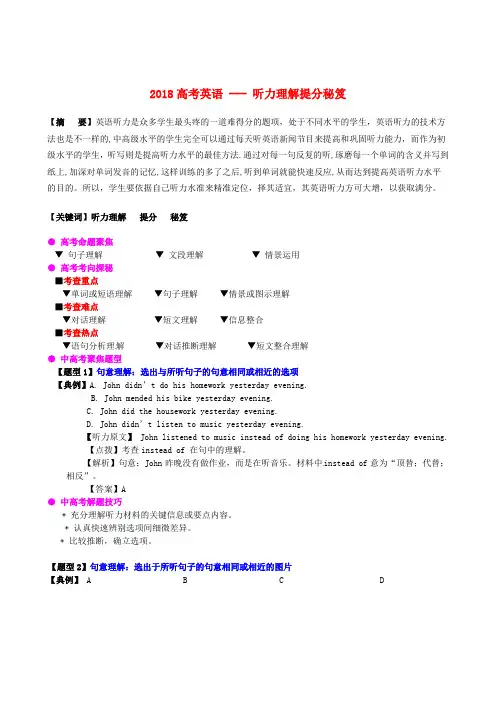
2018高考英语 --- 听力理解提分秘笈【摘要】英语听力是众多学生最头疼的一道难得分的题项,处于不同水平的学生,英语听力的技术方法也是不一样的,中高级水平的学生完全可以通过每天听英语新闻节目来提高和巩固听力能力,而作为初级水平的学生,听写则是提高听力水平的最佳方法.通过对每一句反复的听,琢磨每一个单词的含义并写到纸上,加深对单词发音的记忆,这样训练的多了之后,听到单词就能快速反应,从而达到提高英语听力水平的目的。
所以,学生要依据自己听力水准来精准定位,择其适宜,其英语听力方可大增,以获取满分。
【关键词】听力理解提分秘笈● 高考命题聚焦▼ 句子理解▼ 文段理解▼ 情景运用● 高考考向探秘■考查重点▼单词或短语理解▼句子理解▼情景或图示理解■考查难点▼对话理解▼短文理解▼信息整合■考查热点▼语句分析理解▼对话推断理解▼短文整合理解● 中高考聚焦题型【题型1】句意理解:选出与所听句子的句意相同或相近的选项【典例】A. John didn’t do his homework yesterday evening.B. John mended his bike yesterday evening.C. John did the housework yesterday evening.D. John didn’t listen to music yesterday evening.【听力原文】John listened to music instead of doing his homework yesterday evening.【点拨】考查instead of 在句中的理解。
【解析】句意:John昨晚没有做作业,而是在听音乐。
材料中instead of意为“顶替;代替;相反”。
【答案】A● 中高考解题技巧◈充分理解听力材料的关键信息或要点内容。
◈认真快速辨别选项间细微差异。
◈比较推断,确立选项。
【题型2】句意理解:选出于所听句子的句意相同或相近的图片【典例】 A B C D【听力原文】You mustn’t smoke here.【点拨】考查图片信息的理解。
英语高考听力考试技巧(精选5篇)
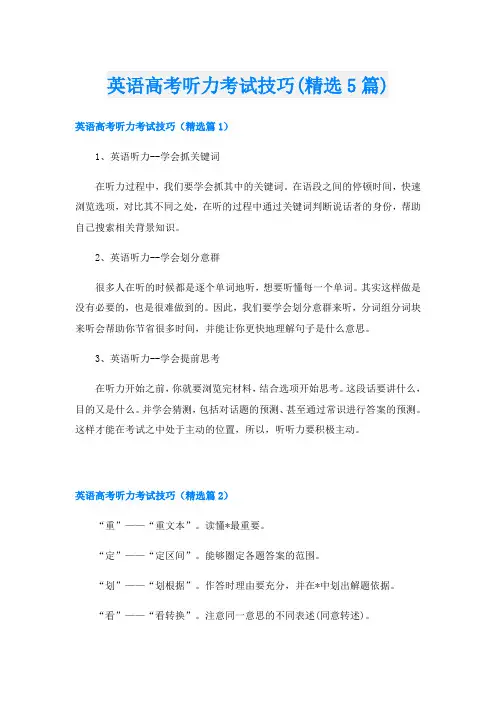
英语高考听力考试技巧(精选5篇)英语高考听力考试技巧(精选篇1)1、英语听力--学会抓关键词在听力过程中,我们要学会抓其中的关键词。
在语段之间的停顿时间,快速浏览选项,对比其不同之处,在听的过程中通过关键词判断说话者的身份,帮助自己搜索相关背景知识。
2、英语听力--学会划分意群很多人在听的时候都是逐个单词地听,想要听懂每一个单词。
其实这样做是没有必要的,也是很难做到的。
因此,我们要学会划分意群来听,分词组分词块来听会帮助你节省很多时间,并能让你更快地理解句子是什么意思。
3、英语听力--学会提前思考在听力开始之前,你就要浏览完材料,结合选项开始思考。
这段话要讲什么,目的又是什么。
并学会猜测,包括对话题的预测、甚至通过常识进行答案的预测。
这样才能在考试之中处于主动的位置,所以,听听力要积极主动。
英语高考听力考试技巧(精选篇2)“重”——“重文本”。
读懂*最重要。
“定”——“定区间”。
能够圈定各题答案的范围。
“划”——“划根据”。
作答时理由要充分,并在*中划出解题依据。
“看”——“看转换”。
注意同一意思的不同表述(同意转述)。
“防”——“防陷井”。
锁定是“true”还是“not true”,辨明形近词。
“读”——“读全项”。
做判断时要通读每一题的所有选项,区分鉴别,选择最佳。
很多同学在英语阅读理解中,都错在了关键的第一步——审题上。
那么到底如何看题干,我们应该看哪里?大部分同学知道,用时间、大写词去定位,但其实这只是最基本的定位信息。
A. 看似松散,一般每篇只有四个问题,实则考查对*中心思想的把握能力。
B. 看似粗线条,根据文中具体信息便可判断正确答案,实则考查句意理解的精确度。
C. 抓住关键句,每段的首句大抵是本段的关键句。
英语高考听力考试技巧(精选篇3)1、集中注意力考生在听英语听力的时候,要稳定自己的心理,这样才能发挥出自己的正常的水平。
而过于紧张焦急的情绪则会容易产生恐惧心理,使听力的反应速度变慢,对把握信息的准确度大打折扣。
(整理版高中英语)高考英语听力试题应答技巧
高考英语听力试题应答技巧一、全方位积累必须熟悉词汇表上的单词,这样才能快速地把听到的单词和记忆中的单词进行意义联系,从而确定听力内容。
不熟悉单词是不可能听懂的。
听力题的理解都是以句子为单位,对常用口语的熟记和对很多句子的表达方式的掌握能使你快速理解话语。
做听力时没有可以分析语句的时间,平时必须多记各种句式。
二、多练常听但不长听,一般以每天十几分钟为宜。
此类题要求根据所给信息归纳原文的主题或者最适宜的标题。
一般为主观性问题,多为wh-ques-tion 形式。
常见有以下问题:what does the passage talk about?what is the passage/talk mainly about?what is the main idea of the passage/talk?what is the best tit le of the passage?对这种类型题,抓住短文的前两句话往往特别重要,因为前两句话往往是主题句,即使不是主题句,也对理解全文有重要的意义。
例如:last friday,a storm to re through two villages in fujian province,14 people were killed.这句话是一篇新闻的开头,很明显是主题句,介绍了新闻的中心内容,下面那么应是对风暴情况的具体表达。
在听力考试中对事实细节题的考查最多,常见的问题是五个w一个h。
1)where -question常见问法:where does the con versation most probably take place?where are the speakers now?对这类问题,考生应注意对话或短文的关键词语,通过关键词语判断地点。
一般情况下,试题常出现的地点有:、商店、餐馆、车站、机场、医院、邮局等。
下面列出其相关词:school:lecture,paper,exam,grades,playground,teacher.restaurant:menu,soup,drink,order,bill.airport/station :train,time table,take off,passenger,flight.post office:parcel,package,stamp,postage.hospit al:cold,fever,pain,cough,trouble,temperature.2)when-question关于这类问题,考生要注意以下几点:●根据表示时间的关联词来判断事件发生的时间,如:befor e,after,the n,until,later,immediately等。
2018高考英语 应试策略与答题技巧 总结
英语各题型提分技巧(1)听力:熟悉常见词汇1.理解归纳话语的主旨要义;2.获取时事性信息;3.根据所获取的信息进行简单推断;4.理解说话者的意图、观点和态度;5.记录或加工所获取的信息。
练习听力有两种:精听和泛听。
针对高考来说,精听就是听真题,先按照考试要求去做。
在试音和絮叨中文的时候,抓紧时间审题,圈出问题的关键词(往往就是特殊疑问词),这样可以提醒自己有针对性地听。
考前也可以用听英文歌、背课文等方法进入英语思维状态。
较难的题,比如最后一组,更需要提前审题。
在做完之后,没听懂的句子反复去听,三遍以上还没听明白就翻看听力原文理解句意。
也可以边听边跟读,读上一遍印象更深刻。
对于出错的题,要反思错因,确保做题的质量。
泛听,可以是课文原文的录音,也可以是高考考纲单词的录音;可以在睡前、洗漱时、上学放学途中等零碎时间听。
平时放松时,也可以多听听英文歌曲,还可以顺便记下其中感兴趣的单词。
听和读是相关的。
如果早自习有时间,可以多朗读课文或者历年真题的完形阅读文章。
朗读过程中,注意重读、弱读、连读、失去爆破等语音现象,自己读得标准,听到这样的情况才能反映过来。
(2)阅读阅读速度提升:1.默读,不要出声,也不要在心里默念。
因为出声或不出声但发音器官仍做轻微运动时,运动的语言中枢会对视觉中枢产生干扰,而默视时,仅由视觉中枢把所看到的文字素材传递给大脑,这样可以从容的进行思考,可以提高阅读速度,又可以加深阅读理解的能力.因此,再进行快速阅读时应采取默视的方法而不采用朗读或不出声的默读(当然,在是识记或背诵方面朗读或默读要优于默视)2.视距大小。
要逐句读,不要逐字读。
眼睛视幅至少要一行,不要只盯着个别单词。
3.集中注意力。
可以先看题再读文章,带着目标去读会让注意力更集中。
4.正确处理阅读中遇到的数字、时间。
说明文尤其常见,可以考虑用铅笔标记出来,以免混淆。
5.抓文中的重要信息。
其分布一般都是有规律的:在记叙和描写性的文体中,单句的重要信息中一般是主语,谓语和宾语;在科技文体、政论文体中,单句的重要信息有更可能是状语、定语和补语;在复句中,大多数偏正复句的重要信息是正句,而在条件复句中,表示唯一条件的分句则是重要信息.在文段中,文段的中心句和文章的主题句以及含主题句的文段是重要信息.了解了阅读材料中重要信息的分布状况,在阅读时便可有的放矢地捕捉有效信息,提高阅读速度。
2018年高考英语蒙题技巧 高考英语如何拿高分
2018年高考英语蒙题技巧高考英语如何拿高分2018年高考英语蒙题技巧高考英语如何拿高分2018年高考已经进入倒计时阶段了,高考考场上如何能够让你的试卷分数突破往常拿高分呢?下文是给大家整理的《2018年高考英语蒙题技巧高考英语如何拿高分》,仅供参考!2018年高考英语蒙题技巧1.透露说话人身份的关键词如果我们可以通过关键词很快判断对话者的关系和身份,将有助于我们有目的地集中注意力,并在脑海中搜索相关背景知识,进一步加深对听力材料的理解。
例如:I just can’t believe you are a police officer, Kay. I remember in high school, you always wanted to be a lawyer. 如果我们意识到该对话中的关键词为in high school,那么我们马上可以意识到这是两个老同学之间的对话。
又例如:Good morning, ladies and gentlemen. Welcome to Universal Studio. I’d like to guide you all the way in the amazing park and share the wonderful moments with you. 这段话的关键词是guide和park, 从中我们可以推断说话人是导游。
以下是常见对话者关系:husband wifeteacher studentboss employeewaiter customerdoctor patientshop assistant customer2.透露地点/场合的关键词如果我们善于捕捉听力材料中的关于地点或场合(即语言环境)的关键词,也有助于我们判断听力材料的主题、说话人之间关系等等。
比如,如果对话中出现special price,那么对话很可能发生在商店;如果出现了treatment,therapy等词可以透露出医患关系,以下是有关机场或者旅馆的关键词:3. 捕捉数字许多听力材料中涉及数字,例如年代、日期、价格、数量等等,并且会以基数词、序数词、分数、小数、百分比等形式出现,这就要求考生辨别各种形式的数字,还要熟悉数字之间的关系。
2018年高考全国II卷英语听力部分
2018年普通高等学校招生全国统一考试(全国II卷)英语注意事项:1. 答卷前,考生务必将自己的姓名、准考证号填写在答题卡上。
2. 回答选择题时,选出每小题答案后,用铅笔把答题卡上对应题目的答案标号涂黑。
如需改动,用橡皮擦干净后,再选涂其他答案标号。
回答非选择题时,将答案写在答题卡上,写在本试卷上无效。
3. 考试结束后,将本试卷和答题卡一并交回。
第一部分听力(共两节,满分30分)做题时,先将答案标在试卷上。
录音内容结束后,你将有两分钟的时间将试卷上的答案转涂到答题卡上。
第一节(共5小题;每小题1.5分,满分7.5分)听下面5段对话。
每段对话后有一个小题,从题中所给的A、B、C三个选项中选出最佳选项。
听完每段对话后,你都有10秒钟的时间来回答有关小题和阅读下一小题。
每段对话仅读一遍。
例:How much is the shirt?A. £19. 15.B. £9. 18.C. £9. 15.答案是C。
1. What does John find difficult in learning German?A. Pronunciation.B. Vocabulary.C. Grammar.2. What is the probable relationship between the speakers?A. Colleagues.B. Brother and sister.C. Teacher and student.3. Where does the conversation probably take place?A. In a bank.B. At a ticket office.C. On a train.A. A restaurant.B. A street.C. A dish.5. What does the woman think of her interview?A. It was tough.B. It was interesting.C. It was successful.第二节(共15小题;每小题1.5分,满分22.5分)听下面5段对话或独白。
- 1、下载文档前请自行甄别文档内容的完整性,平台不提供额外的编辑、内容补充、找答案等附加服务。
- 2、"仅部分预览"的文档,不可在线预览部分如存在完整性等问题,可反馈申请退款(可完整预览的文档不适用该条件!)。
- 3、如文档侵犯您的权益,请联系客服反馈,我们会尽快为您处理(人工客服工作时间:9:00-18:30)。
2017高考英语听力应试技巧和解题方法
高考英语听力测试部分在整套试题中占有重要地位。
它要求考生从头到尾按顺序往下听,在有限的时间内做出选择,没有“回头看”的余地。
多年的高三教学工作笔者发现学生长期进行听力训练并且掌握一些基本的听力应试技巧,对于在考场上正常发挥水平,取得理想的成绩尤为重要。
下面就结合近几年的高考英语听力试题介绍一些应试技巧和解题的基本方法。
一、学会预测
预测是在做听力理解之前根据各种暗示,如所给答案选项,段落或对话标题等已有知识,对即将听到的段落或对话内容进行预测。
1. 从答案选项中预测
Q: What does Tom do?
A. He’s a truck driver.
B. He’s a ship captain.
C. He’s a pilot.
录音原文:
W: Tom flew to Anchorage last night, then took some passengers from there to Dallas .
M: Yeah, but he couldn't land because the airport in Dallas was snowed in.
从选项看,问题应是关于职业方面的,再从flew, passengers, airport这些信息词中可知道Tom的职业。
2. 从说话人口气预测:
在A,B两人的对话中,如果B是附和或赞成,往往说“Yes”,“I agree”,
“Neither / Nor…”
“I think so”等。
但如A用否定句,B表同意时则用“No”,
“Sure”,
等。
例如:
A: Harvey doesn't seem to fit into this class. B: No, he is really a fish out of water.
二、做简要笔记
听录音时快速,准确,简要地记下有关信息(包括数字,人名,地名,关键词),前提是不要影响跟听速度,采用自己习惯的符号。
例:How much will the man pay for the tickets?
A.$18
B. $24
C. $30
原文:W: Tickets for the movie are $ 6 for adults, half price for children.
M: All right, I’d like three tickets for adults and two tickets for children, please.
笔记可简化为:$ 6 A(A代表adult),C代表children,3A+2C或6 A(3)+ half C(2)
三、听清数据,简要记录,加以运算。
在获取时间信息时,不要误把会话中提到的时间简单确定为问题的答案。
高考听力考查时间时往往要进行简单的时间换算。
At what time does the train to Leeds leave?
A. 3:00
B. 3:15
C. 5:00
录音原文: W: Excuse me, could you tell me when the next train to Manchester is?
M: Sure. Well, it's 3 now. The next train to Manchester leaves in 2 hours, but you can take the train to Leeds which leaves in 15 minutes, and then get off at Manchester on the way.
对话中提到了三个时间It's 3 now, in 2 hours,in 15 minutes.现在是3点,开往Manchester的火车要两小时后才开,即The train to Manchester leaves in 2 hours。
若简单机械地把3点和2点相加,会得出火车5点才开的错误选项C。
数字类问题分辨别类和计算类两种:
1. 要注意区分-teen和-ty及four和five的发音;辨别多位数,如电话号码,门牌等
2. 计算时间,钱款,距离,年龄,人或物的数量等;听出数字间的关系,更要听清问题,因为对运算方法的要求通常寓于问题中;注意more, less, as much(many)as, another, double, a couple of; to, past, quarter; 记住时间是60进制如出现几个数字,应注意鉴别问的是那一个。
例:At what time does the office open?
A. At 8:15
B. At 8:30
C. At 7:45
从常识判断,办公时间往往以整点开始,而不会在几点几分。
听力原文:M: I wonder why the office is still not open.
W: But it's not yet eight. In fact, it's only a quarter to eight.
四、抓住关键词,对症下药
听力考试常出现以Where提问的问句,考生要通过对话的具体情节和背景判断对话发生的地点。
一般来说,特定场景的用语和关键词是基本固定的,考生要对此多了解,熟悉明白。
在遇到Where does the conversation take place?/ Where does sb. work?
What’s his job?之类的问题时,就会派上用场。
如: restaurant: menu, bill, order, tip, hamburger, beer, soup
hotel: luggage, single room, double room, room number, check in(out)
hospital: take medicine, temperature, pill, headache, fever, examine
post office: mail, deliver, stamp, envelope, parcel
airport: flight, take off, land, luggage
railway station :round trip, single trip, sleeping car
store: on sale, size, wear, color, style, price, change,bargain, fit
school: professor, exam, course, term, dining hall, playground
library: librarian, renew, date, shelf, magazine, seat
对于前五道简短对话,要根据问题的类型,从第二个讲话者的答语中来捕捉关键词
如:What’s the man going to do?
A. Run to the airport.
B. Wait for another bus.
C. Hurry to get the next bus.
根据选项看,对话似乎与bus有关,主要信息捕捉范围是在“Hurry”或“Run”和“Wait”之间。
听音范围明显缩小。
原文M: Excuse me, can you tell me when the next bus leaves for the airport?
W: It leaves in three minutes. If you run, you might catch it.
关键词“run”和“catch”正好对上答案C的“Hurry”和“get”。
五、较长对话和短文的理解
抓听首句和首段有助于整体理解文章;结尾部分所给出的信息不一定是题目的正确答案,可能只是一个陷阱;推理思路要正确;语境中抓要点。
独白部分(即第十段材料)可分为四种类型:
*人物与故事型:叙述人物的经历和成就,要抓住故事发展线索,所问问题多属事实细节题
*普通知识型:内容涉及面较广,问题以事实细节题居多
*社会科学型:涉及到文化教育,社会治安,代沟问题,就业问题,妇女问题,人口问题,环境保护,国家发展等。
问题常涉及独白的主题或题目,故需作推理判断。
*科普知识型:主要涉及自然科学,如生物,物理,海洋,计算机,医学,气象,科学发明等。
如遇专业词汇和术语,可利用语境线索猜词义。
六、果断选题,学会放弃
相信第一感觉,当机立断,决不能反反复复,甚至影响后面的答题,切记不可因某个小题未听懂而患得患失,不可因一题失多题,造成一步跟不上,步步皆踏空的结果。
总之,只要掌握基本的听力技巧和方法、排除一切干扰,全身心地投入语境、持之以恒地坚持高考全真模拟听力训练,高考中定能取得理想的成绩。
